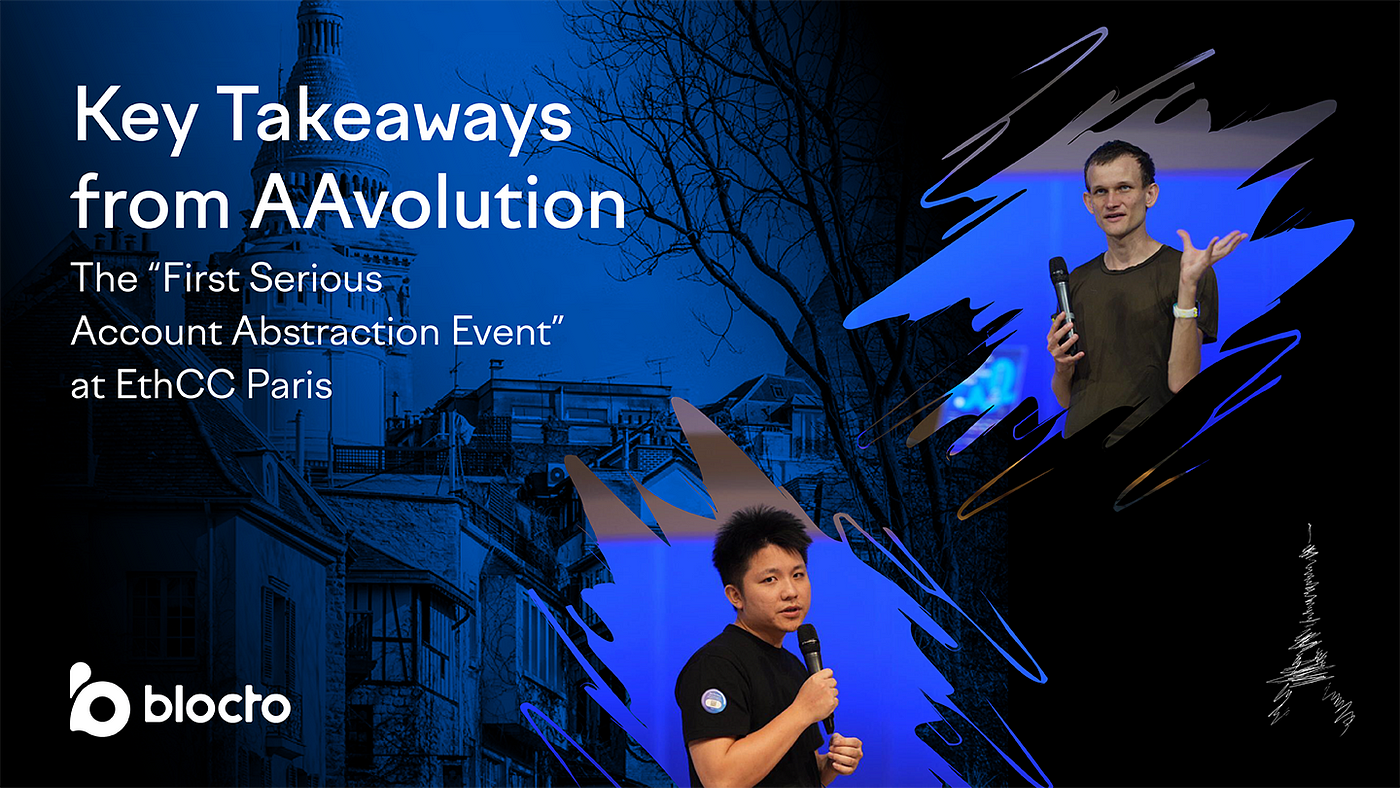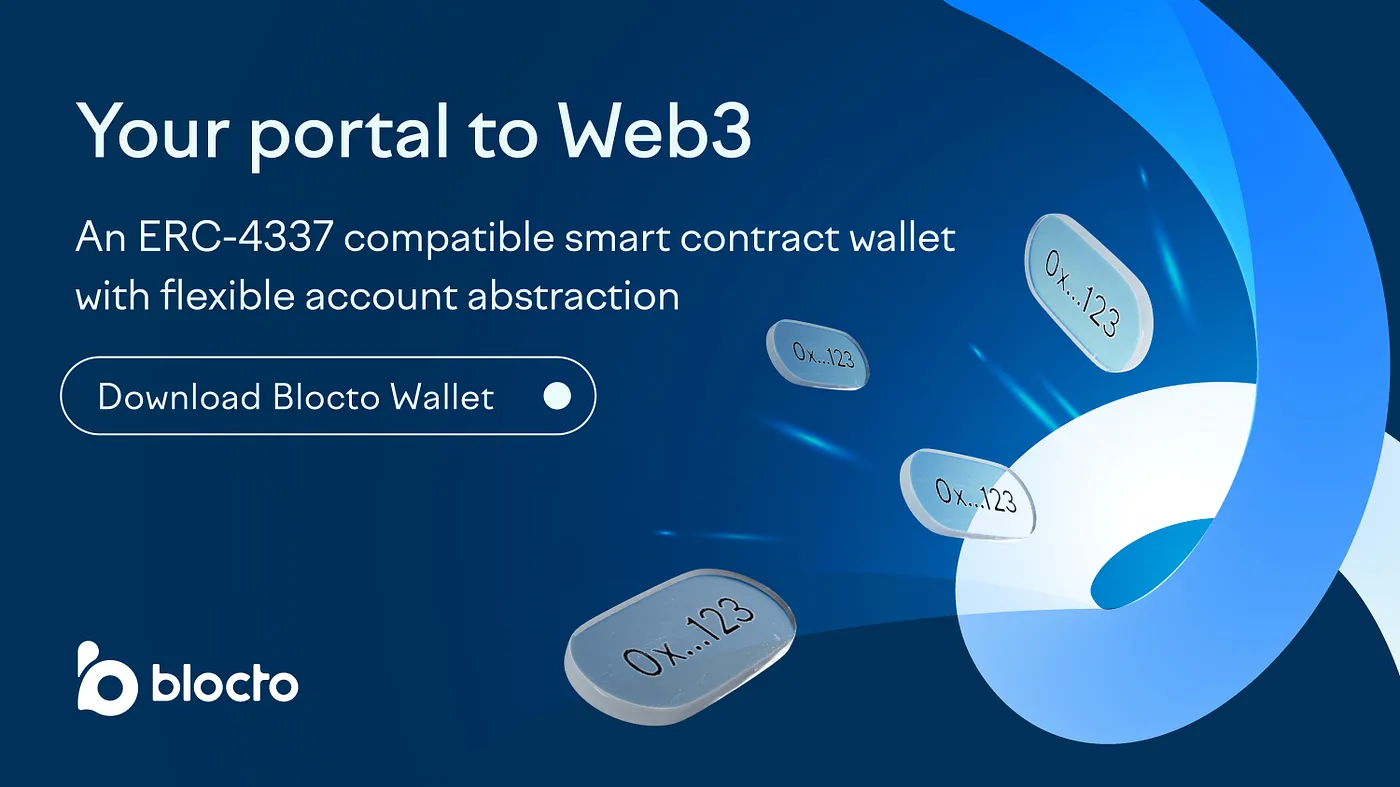
Find out what went down at the “first serious account abstraction event” at EthCC.
TL;DR AAvolution, a community-driven account abstraction event, took place at EthCC in Paris. Vitalik Buterin discussed the history of account abstraction and its challenges. Panel discussions focused on the future of account abstraction wallets and a multi-chain future. Blocto introduced its new ERC 4337-compatible wallet. The event was a success, gathering industry leaders and developers to discuss the significance of account abstraction in Web3. Attendees engaged in intellectual discussions and learned about various account abstraction projects. The event showcased the importance of cooperation and building together to push account abstraction forward in the crypto space.
On July 20th, Blocto, along with 15+ key industry partners and account abstraction (AA) projects, hosted AAvolution, “the first serious account abstraction event” at this year’s EthCC in Paris. Endorsed by Vitalik himself, who also honored us with his presence (more on his keynote later), the community-driven account abstraction event of the year was a complete success with a whopping 300 attendees out of 1000+ registrations. Not only was the feedback from attendees overwhelmingly positive, but it was also a haven for intellectual discussions and learning about account abstraction.
Just as the greatest writers of modern literature gathered in Paris during the 1920s to discuss the arts, the brightest developers and industry leaders spearheading account abstraction convened at AAvolution to take a deep look into the history of account abstraction, current trends, and future possibilities, in addition to the significance of account abstraction in onboarding the next billion users onto Web3.
AAvolution showed how important it is for the account abstraction (AA) community to stand together to push AA forward into the forefront of Web3. By cooperating and building together, the future of AA looks brighter than ever.
Now, let’s get into the details of what went down!
In the beginning: The genesis of AAvolution
After a brief intro with a catchy song about account abstraction playing on the speakers, the event kicked off with a presentation on Schnorr signatures and account abstraction from Ivo Georgiev, CEO and Co-Founder of Ambire Wallet. He discussed not only the difference between MPC and smart contract wallets, but also how Schnorr signatures worked well with AA and are a viable alternative solution to the problems surrounding MPC wallets.
Time traveling through the history of account abstraction
Next came one of the highlights of the event: Vitalik Buterin (Co-Founder of Ethereum) on the history of account abstraction.
Vitalik gave an in-depth look into the history of account abstraction (AA), starting with the Ethereum community’s first attempt at AA through EIP-86 in 2016. Did you know the P2SH, or “pay to script hash,” was inspired by Bitcoin? From 2017 to 2018, different goals were proposed ranging from the abstraction of signature verification and nonce checking on account contracts to verification-time access restrictions.
However, there were still a number of issues during this time, such as:
- New users had to find existing users to create an AA account
- Required complex logic inside accounts to handle transactions, refunds, etc.
- Non-unique transaction hashes due to constantly updated nonces
- Multi-invalidation resulting in DOS attacks
In 2020, a couple more EIPs were proposed to address the underlying problems. EIP-2938 solved some of the issues by enabling contracts to be the top-level account that can pay fees and enact transaction execution, but it was fundamentally too complex. EIP-3074 took an unorthodox approach by adapting EOAs, as opposed to converting smart contracts to EOAs, and making the changes for them to act like smart contracts.
Everything changed in 2021 when ERC-4337 was proposed and accepted by the community as the definitive document for account abstraction (AA), which outlined the key components of AA that we know today: UserOperation, EntryPoint, Bundler, Paymaster, and Aggregator. As Vitalik’s keynote was coming to an end, he discussed the current challenges facing AA:
- Current EOAs cannot upgrade to AA accounts
- Standardization across L2s
- Integration into existing wallets and existing tech like biometric signers
- Striking a balance between efficiency and anti-censorship
Vitalik finished his keynote on a positive note, emphasizing the paradigm shift that account abstraction will bring into the Web3 landscape. Learn about the key benefits of account abstraction here.
Smart contract wallets, lessons learned, & a multi-chain future
After Vitalik’s thorough history lesson on account abstraction, the rest of the afternoon was filled with more insightful discussions featuring keynotes and panels. Here are the key takeaways from each session.
Panel 1: The Future of Smart Contract Wallets
We segued smoothly into the first panel on the future of smart contract wallets, which featured Blocto’s CEO and Co-Founder Hsuan Lee, Etherspot’s Co-Founder Michael Messele, Stackup’s Co-Founder John Rising, Ethereum Foundation’s ERC-4337 PM Tom Teman, and moderated by Blocto’s Events/Community Manager Claire Yao.
Through account abstraction, the panelists envision a future where people can have a smooth and secure user experience on wallets and dApps without technical knowledge of blockchain. John from Stackup said “One way I see wallets adapting to that is helping users view their wallet as an account–not only a wallet.” Additionally, he emphasized the significant upgrade in safety and security that smart contract wallets usher in for users, which will be supported by developments to the access control layer as noted by Tom from Ethereum Foundation. Tom was optimistic that we will first see native account abstraction on L2s because more adoption will force developers to implement AA on the mainnet.
Moving on, Hsuan from Blocto pointed out that there are still technical hurdles to overcome for new smart contract wallet users, which can be improved through account abstraction-enabled customizability with features such as mixed custodial mode and more flexible ways to pay for transaction fees. The panelists foresee EOAs eventually phasing out, while smart contract wallets become the dominant account type, ultimately revolutionizing the way mainstream users think about Web3 accounts.
Lessons from 3 Years of Account Abstraction: Why We Migrated to ERC-4337
Following the first panel was a reflective keynote from Fuse Lab’s CEO Mark Smargon on “Lessons from 3 Years of Account Abstraction: Why We Migrated to ERC-4337.” On their mission to redefine Web3 payments and create a business-friendly blockchain ecosystem, Fuse decided account abstraction was the best way to approach their goals as the first B2B2C blockchain for business adoption and meet the growing business demand for different verticals such as gaming, ticketing, etc. Some lessons they learned were that account abstraction was effective for fee sponsorship to implement gasless transactions (Paymaster logic) and for a new payment flow that involved the Fuse Blockchain, Fuse Box (bundler + backend services), UserOperations, RPC, oracles, and graphs, in addition to the Power Validator who receives transactions, validate, bundle, and relay them to the blockchain network.
Introducing the ERC-4337 compatible Blocto Wallet
Next on the agenda was the introduction of Blocto’s new ERC 4337-compatible wallet from our brilliant VP of Engineering Scott Chou. He started the keynote mentioning Blocto’s mission: “make blockchain simple for users,” which acted as a guiding north star in the development of the ERC 4337-compatible Blocto Wallet. Scott then began his comprehensive presentation and demo on the ERC 4337-compatible Blocto Wallet, which features a complete set of account abstraction capabilities, including seamless onboarding via email/social login, both custodial and non-custodial modes, cross-platform UX, gas fee subsidization via Blocto Points, and much more! Read Blocto’s full announcement on our ERC 4337-compatible wallet for more information and click here to try Blocto Wallet today!
Panel 2 — A Multi-Chain Future: Key Catalysts to Mass Adoption
The final panel of the jam-packed afternoon was a discussion focused on “A Multi-Chain Future: Key Catalysts to Mass Adoption,’ moderated by Blocto’s CEO and Co-Founder Hsuan Lee, with a panelist lineup of ERC-4337’s Co-Author Yoav Weiss, Gelato’s Co-Founder Luis Schliesske, Flow’s Senior Software Engineer Jeff Doyle, and zkSync’s DevRel Engineer Dennis Huisman.
The panel hit the ground running with the central question: “What do you think the multi-chain future will look like? And what role will your project have?” Yoav from Ethereum Foundation stated the entire scaling strategy of Ethereum is through L2s to make cross-chain transactions easier and transparent. Dennis from zkSync asserted the multi-chain future is already here and the recently announced ZK Stack aims to cater to a multi-chain world that can interact seamlessly with each other.
Luis from Gelato stressed the importance of front-end users being unaware of what blockchain is being used as we move forward into a multi-chain future and mainstream adoption. Users should only need to understand that they are using an application, which should happen as fees also become negligible and UX becomes simplified. He also made an interesting outlook into the future by making a comparison between potential monetization strategies through account abstraction and how Netflix users don’t receive a bill from AWS for watching a movie. Instead of paying AWS, users pay Netflix based on another subscription model that abstracts the complexities of the infrastructure, which is similar to how account abstraction abstracts gas fees.
Lastly, a final takeaway from this panel was that account abstraction (AA) will continue to play a vital role in a multi-chain future because AA adds a lot of flexibility in how users interact with dApps, whether it’s different verification methods or different ways to pay for transaction fees. Through AA, users will ultimately be able to seamlessly use different chains to achieve whatever they want to do–without compromising UX and knowing blockchain knowledge.
Final thoughts
Overall, AAvolution was a historic moment in account abstraction history that brought together the greatest minds working on account abstraction in one special space to not only discuss the history of account abstraction, the future of AA wallets, and key catalysts to mass adoption, but also learn about the vibrant community of various account abstraction projects working on implementing AA into their products and solutions.
Aside from the wonderful keynotes and panels, there were pockets of small discussions happening in between sessions, Blocto merch (designed by our talented visual designers Kai and Jimmy) being distributed, and overall fun being had by the attendees.
A huge thank you from the Blocto team to all the wonderful panelists, speakers, partners, and guests who came out to support AAvolution at EthCC Paris this year. Without everyone’s support, none of this would have been possible. Cheers to more “serious account abstraction events” and see you at the next event!
If you’re hungry for more knowledge on account abstraction, check out these articles:
- Unlocking Wallet Potential: Explorign EVM Account Abstraction (EIP-4337)
- Meet the Top 10 ERC-4337 Projects to Watch in 2023 Pt. 1
- Meet the Top 10 ERC-4337 Projects to Watch in 2023 Pt. 2
- Demystifying ERC-4337 & Smart Contract Wallets: 3 Common Misconceptions & 3 Key Challenges
- ERC-6900 & Modular Account Abstraction: What It Means for Smart Contract Wallets
- Smart contract wallet is the future, and Blocto is the hidden gem
Join the Blocto Community for more updates!
Website | Medium | Official Twitter | Dev Twitter | Github | Telegram | Discord | Instagram | Facebook | Linkedin

